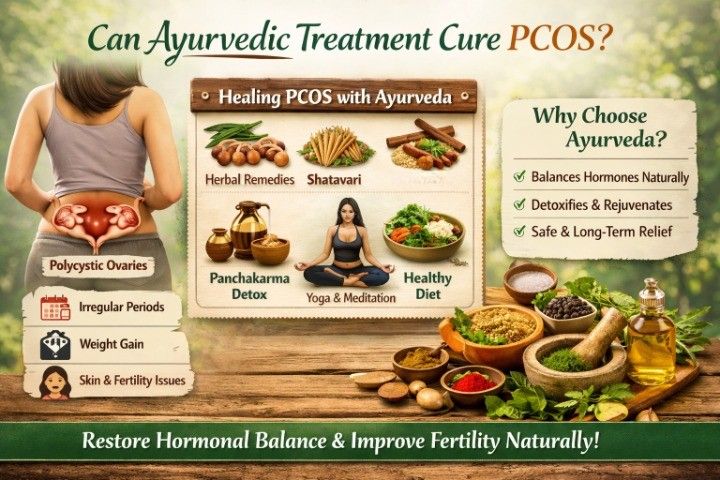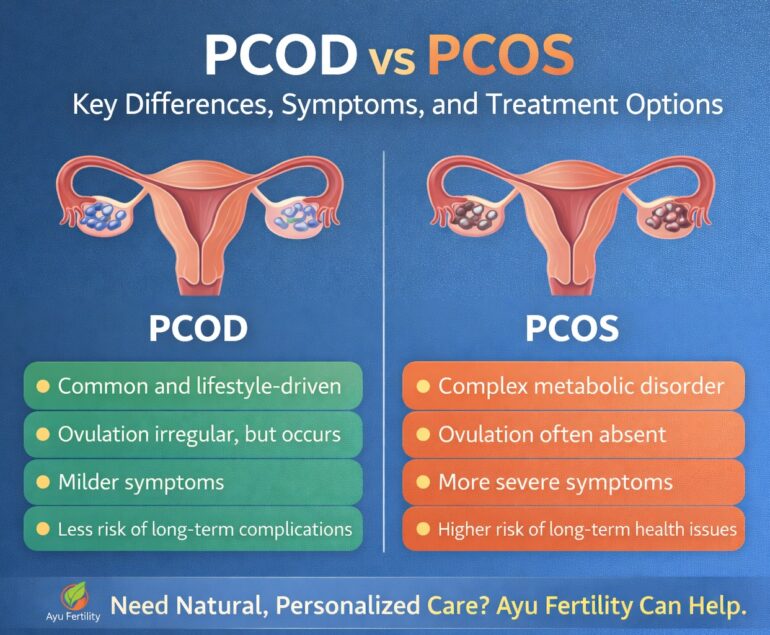According to Ayurveda, PCOS is characterized by a disruption of the doshas, specifically the Pitta and Kapha doshas, as well as a vitiation of the blood and plasma tissues. Hormonal balance is upset due to this imbalance, which causes ovarian cysts to develop. Restoring dosha balance and advancing general health are the main goals of Ayurvedic medicine.
Women of reproductive age frequently suffer from Polycystic Ovary Syndrome (PCOS), which is a hormonal condition that causes irregular menstrual periods, excessive hair growth, weight gain, and occasionally trouble conceiving. Ayurveda provides a comprehensive approach that addresses the underlying causes of PCOS, as compared to conventional medicine that treats symptoms. Ayurveda provides a comprehensive approach to addressing PCOS, ranging from lifestyle adjustments to specific treatments like panchakarma (detoxification therapies) and abhyanga (oil massage).
Symptoms of PCOS
Symptoms of PCOD are:
- Irregular cycles of menstruation
- Hirsutism, or excessive hair growth
- Gaining weight and having trouble dropping it
- Oily skin and acne
- Hair loss or thinning
- Darkening of the skin, especially under the breasts, in the groin, and the creases around the neck
- Depression and mood fluctuations
- Infertility or difficulty conceiving
Why PCOS Occurs in Women
PCOD occur due to the following reasons:
- Hormonal imbalance: The main cause of PCOS is an excess of androgens, or male hormones, such as testosterone, which results in an imbalance in reproductive hormones.
- Insulin resistance: Insulin resistance, which is frequently linked to obesity, is a major factor in the development of PCOS since it raises insulin levels and causes the body to produce more testosterone.
- Hereditary factors: The fact that PCOS frequently runs in families raises the possibility that the illness has a hereditary basis.
- Environmental factors: A sedentary lifestyle, a poor diet, and long-term stress can all lead to the onset and aggravation of PCOS symptoms.
How PCOS Affects Women
PCOD affects women in certain ways:
- Period irregularities: PCOS throws off the typical menstrual cycle, resulting in sporadic or non-existent periods that may have an impact on fertility.
- Infertility: Women with PCOS frequently experience difficulty ovulating, which makes conception difficult.
- Metabolic Complications: PCOS raises the risk of developing metabolic syndrome, type 2 diabetes, high blood pressure, and cardiovascular disease because of insulin resistance and obesity.
- Psychological impact: Infertility and hormonal changes combined with the physical symptoms of PCOS can cause anxiety, despair, and low self-esteem in women who are affected.
Why ayurveda is best for PCOS
Ayurveda is the best way of treating PCOS because it has-
- Holistic approach: Ayurveda views the patient as a whole and concentrates on reestablishing equilibrium in the body, mind, and spirit rather than only treating symptoms.
- Customized care: Ayurvedic medicine treats PCOS by resolving underlying imbalances and enhancing general health, based on the constitution of each patient.
- Focus on lifestyle modification: Ayurveda places a strong emphasis on food, exercise, stress reduction, and good sleep hygiene to control PCOS. These lifestyle modifications are sustainable and promote long-term health.
- Natural therapies: Ayurvedic therapies are mild, natural, and free of adverse effects. Examples include yoga, panchakarma detoxification treatments, herbal cures, and abhyanga.
- Addressing root causes: Ayurveda recognizes and treats the hormonal imbalance, insulin resistance, and stress that are the main causes of PCOS to provide more effective and long-lasting effects.
Approach of Ayurveda in treating Ayurveda
- Abhyanga: Women with PCOS are advised to undergo abhyanga, a traditional Ayurvedic oil massage. Warm herbal oils are used to massage the body; this enhances blood circulation and aids in hormone balance and detoxification. Oils like castor or sesame oil can be applied to the abdomen to balance hormone levels and stimulate the reproductive organs in PCOS patients.
- Lifestyle Adjustments: Ayurveda places a strong emphasis on the role that lifestyle adjustments play in PCOS management. This involves giving up processed foods and sugary snacks in favour of a balanced diet full of healthy grains, fresh fruits, and vegetables. Getting enough sleep, managing stress with yoga and meditation, and engaging in regular exercise are all essential components in changing our lifestyle.
- The Dietary Recommendations: Ayurveda recommends dietary adjustments to help balance the inflamed doshas in PCOS. Incorporating warming spices such as turmeric, cinnamon, and ginger into meals helps enhance metabolism and digestion. Hormone balance can also be supported through fenugreek and spearmint herbal teas. It is best to stay away from dairy, refined sweets, and too much caffeine because these can make hormone abnormalities worse.
- Herbal remedies: The use of Ayurvedic medicines is essential in the treatment of PCOS. Herbs with hormone-balancing qualities include Shatavari, Ashwagandha, and Guduchi. These herbs can be taken as decoctions, powders, or capsules. Triphala is also good for detoxifying and better digestion.
- Yoga and pranayama: Ayurvedic treatment for PCOS includes both yoga and pranayama or breathing techniques. Certain yoga poses, such as the Sun Salutation (Surya Namaskar), the Cobra Pose (Bhujangasana), and the Seated Forward Bend (Paschimottanasana), improve blood flow to the pelvic area and control hormone release. Pranayama methods that encourage relaxation and lower stress levels include Bhramari (bee breath) and alternate nostril breathing.
- Panchakarma therapies: PCOS can be effectively treated with panchakarma, an Ayurvedic detoxification technique. The goals of these treatments are to detoxify the body, balance the system, and revitalize the reproductive system. Panchakarma treatments for PCOS include Vamana (emesis), Virechana (purgation), and Basti (medicated enema) under the guidance of a skilled Ayurvedic practitioner.
- Stress Management: Stress throws off the hormonal balance, which exacerbates the symptoms of PCOS. Ayurveda places a strong emphasis on the benefits of stress-reduction methods like pranayama, meditation, and mindfulness exercises to elevate mood and lower cortisol levels. Hormonal balance also depends on getting enough sleep and relaxation.
Therefore, Ayurvedic doctor for PCOS provides a comprehensive strategy to manage PCOS, even though the condition can have a substantial negative influence on the physical and mental health of a woman. Ayurvedic medicine targets the underlying causes of PCOS and enhances general health and vitality through lifestyle changes and specialized therapies like abhyanga and panchakarma. If you are looking for the leading ayurvedic infertility clinic in Shahdara then ayu fertility is the best one. The clinic has the best Ayurvedic doctor who has expertise in treating PCOD effectively. Women with PCOS can find healing and take back control of their health and fertility if they get in touch with our certified and embrace Ayurvedic principles.




